LIVE: Polls close in Cote d’Ivoire elections 2025, vote counting underway
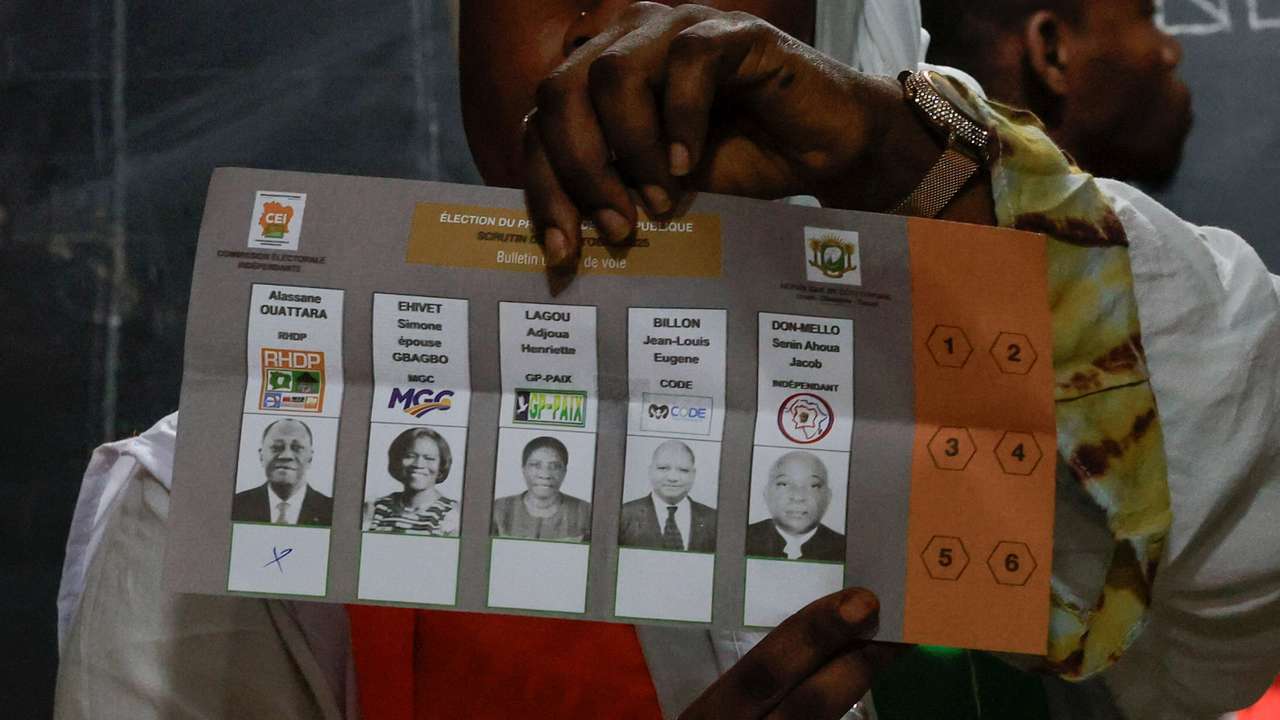
Welcome to GSW’s live coverage of the October 25, Cote d'Ivoire elections, amid widespread anger over 83-year-old President Alassane Ouattara’s decision to seek a fourth term after a ban on opposition candidates, and extend his rule over the world’s largest cocoa producer and West Africa’s second-largest economy.
Live updates
This concludes our live coverage of the October 25 Côte d’Ivoire elections. Vote counting is currently in progress. Follow Global South World for further updates as we await the official results from the Independent Electoral Commission.
18:05 GMT: Polls close in Côte d'Ivoire presidential election, with Ouattara eyeing a fourth term amid global scrutiny.
17:14 GMT: Polls are expected to close at 18:00 GMT
16:40 GMT: Ballot boxes have been destroyed and electoral materials vandalized in several polling stations in the sub-prefecture of Zaguiéta, particularly in Biegon, Dianoufla, Tofla, Bounantinfla, and Banonfla.
15:42 GMT: The CEI provisionally bans polling stations from the media
15:36 GMT: Presidential Candidate and sitting president Alassane Ouattara addresses the media after casting his vote
15:30 GMT: Electoral Observers monitor the voting process across several polling stations.
14:03 GMT: Presidential candidates Jean-Louis Billon and Henriette Lagou cast their votes. 60-year-old Louis Billon served as minister under President Ouattara’s first two terms. First as Minister of Trade, Crafts and SME between 2012 and 2016 and then as Minister of Commerce from 2016 to 2017. Alongside Jacqueline-Claire Kouangoua, Lagou, 66, a well-known advocate for women's rights and a former minister under former President Gbagbo, was one of the first two women to run for president of Côte d'Ivoire in the 2015 presidential election.
13:40 GMT: At a polling station of the Lycee Saint-Marie de Cocody in Abidjan, presidential candidate Ahoua Don Mello casts his ballot



13:27 GMT: The entire country is set up to enable "voters to exercise their right to vote in complete safety," says Ivorian Minister of the Interior, Vagondo Diomande
12:40 GMT: Members of the Ivorian diaspora gathered at polling stations in Paris to vote. Footage captured officials from the Independent Electoral Commission assisting voters amid large crowds both inside and outside the venue. One voter described participating as a civic duty.
12:15 GMT: 83-year-old President Ouattara, seeking a fourth consecutive term, votes alongside his wife Dominique Ouattara at a polling station at the Lycee Saint-Marie de Cocody in Abidjan
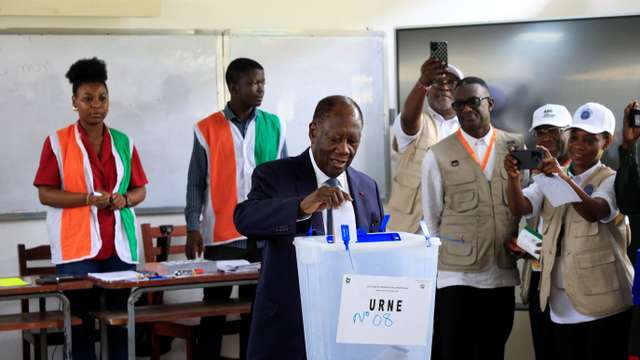



12:07 GMT: Simone Gbagbo, candidate of the Movement of Skilled Generations and wife of former President Laurent Gbagbo, casts her vote at a polling station inside a school in Abidjan


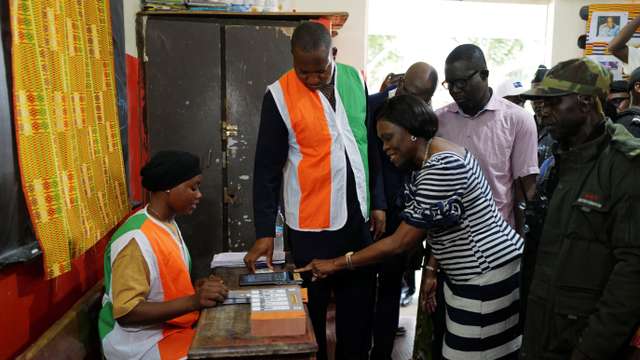

12:00 GMT: 5 hours since polls were officially opened, although voting at most centres commenced later than the stipulated time, polls are expected to officially be closed by 18:00 GMT, according to the CEI.

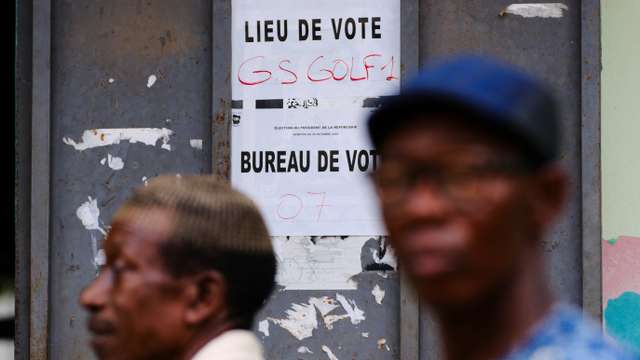
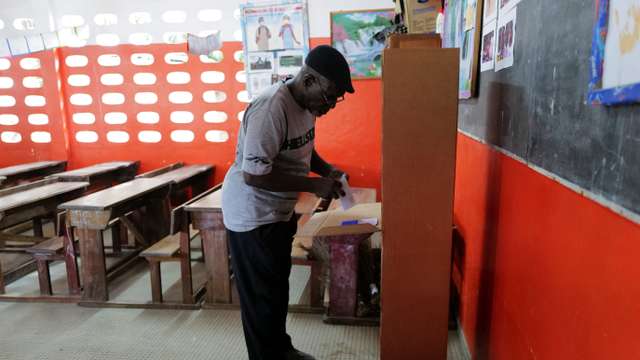

11:52 GMT: Ivorian women's rights advocate Laetitia Carelle Goli urges the new administration to put women's rights first, create a framework to stop femicide, and open up public space
10:43 GMT: Will Ivorians choose continuity or change at the polls today?
10:05 GMT: 3 hours after polls opened, voting continues smoothly with no reports of violence or electoral malpractice. The first voters have already cast their ballots.
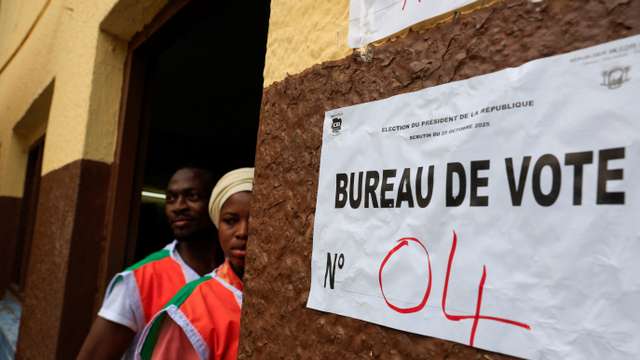
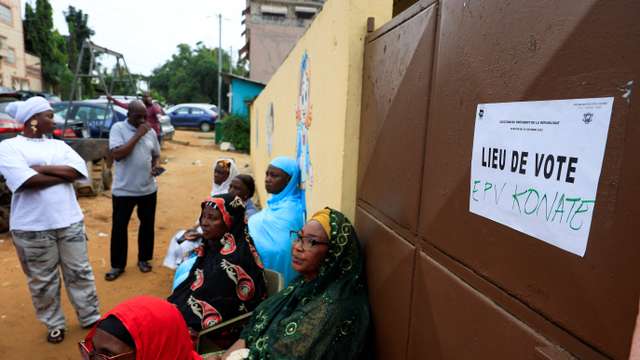

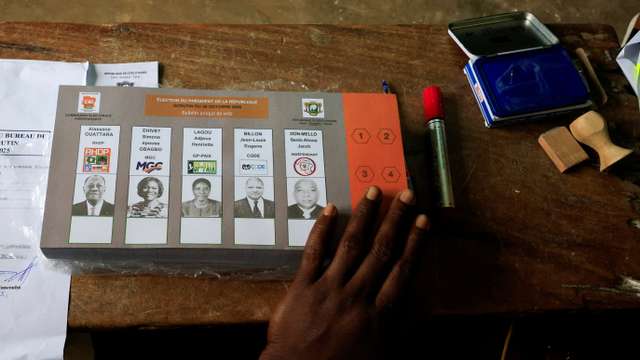



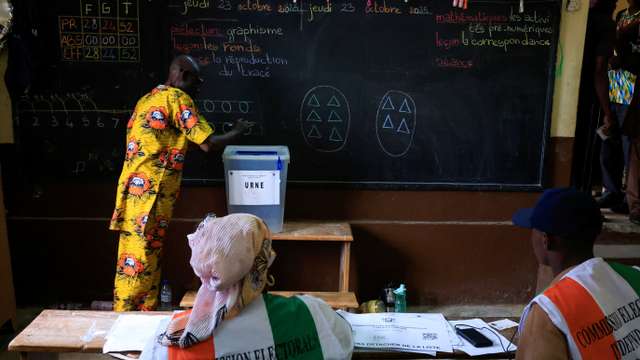
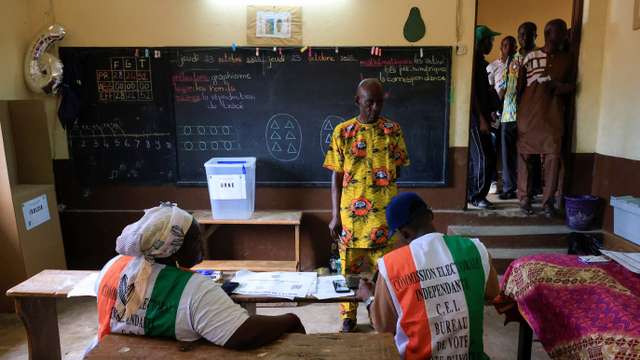


9:26 GMT: Polls open in neighbouring West African countries as Ivorian expats vote at foreign embassies
8:58 GMT: Representatives of the African Union and ECOWAS visit first polling station
8:15 GMT: The ghost of 2020: Will Ivory Coast avoid another election crisis?

Many Ivorians are haunted by memories of 2020, a year that reignited violent divisions, cost dozens of lives, and cast a long shadow over the country’s democratic future. Today, the same patterns are emerging again: disputed candidacies, allegations of a corrupted voter list, arrests of protestors and journalists, and a president pushing past term limits.
“People are supposed to be in the streets for three or four days until the guy changes position...But some people are afraid,” an Ivorian journalist told Global South World.
7:44 GMT: Ivorians in France queue in their numbers at the Embassy to cast their votes
7:11 GMT: Over 66 African Union observers have been deployed to witness the election
7:00 GMT: Polls open across various polling centres nationwide as voters line up to cast their ballots






00:22 GMT: Electoral materials at one of the polling station storage facilities a few hours prior to the opening of polling stations on election day
22:44 GMT October 24: A computer programmer responsible for managing the server for publishing Côte d'Ivoire’s presidential election results on Abidjan.net was urgently summoned by the Presidency’s communication unit after an error revealed details of a prearranged plan allegedly linked to President Alassane Dramane Ouattara. The mistake occurred when the programmer entered Friday, October 24, 2025, instead of Saturday, October 25, 2025, the official election date. Following the incident, Ouattara reportedly contacted the president of the Independent Electoral Commission (CEI) for clarification regarding the error.
19:42 GMT October 24: On the eve of the presidential election, the president of Côte d’Ivoire’s Independent Electoral Commission (CEI), Coulibaly-Kuibiert Ibrahime, addressed the nation, urging citizens to exercise their civic duty with calm, discipline, and confidence
17:55 GMT October 24: Prof. Yemi Osinbajo, former Vice-President of Nigeria and Head of the Joint ECOWAS-African Union Election Observation Mission (EOM), meets with President Ouattara.
Prof. Osinbajo also held a series of meetings from 21 to 23 October in Abidjan with key electoral stakeholders, including Ivorian officials, political party representatives, African ambassadors, and ECOWAS observers. He met with members of the Independent Electoral Commission, the Constitutional Council, and other national institutions to assess the electoral process and security preparations.
Polls are expected to open at 07:00 GMT and close at 18:00 GMT across all polling stations.
What you need to know
The vote comes at a time when the country is balancing rapid economic growth with persistent political divisions, and the outcome could redefine both its democratic trajectory and its regional role.
At the centre of this year’s race is President Alassane Ouattara, who has led the country since 2011. His decision to seek a fourth term has reignited debate over constitutional limits and political succession. Supporters argue that his leadership has brought stability and economic progress, while critics say his continued presence risks undermining democratic norms in a country still haunted by memories of the 2010–2011 post-electoral crisis, which left thousands dead.
Electoral system and voter roll
Under Côte d’Ivoire’s two-round electoral system, a candidate must secure more than 50% of the vote to win outright. If no one achieves that threshold, the top two contenders advance to a runoff.
Over 20,000 polling stations are expected nationwide; however, questions remain about voter registration accuracy and access for displaced or rural populations.
When will the results be announced?
The Independent Electoral Commission (CEI) is managing the process and is expected to release provisional results within five days, after which the Constitutional Council will certify the final outcome.
Who’s on the ballot — and who isn’t
The final candidate list has been sharply reduced after the electoral court validated just five contenders out of roughly sixty submissions. Among those cleared to run are Simone Ehivet Gbagbo, the former first lady, and several lesser-known opposition figures.
However, two of the most prominent figures, Laurent Gbagbo, the former president, and Tidjane Thiam, ex-Credit Suisse CEO, have been barred from contesting. Authorities cited legal and nationality issues, but the disqualifications have deepened claims that the political space is being narrowed. Both men command significant popular support, and their exclusion could shape voter turnout and legitimacy perceptions.
High stakes for democracy
For many Ivorians, this election is not only about leadership but also about trust in the democratic process. The 2020 vote was marred by boycotts and sporadic violence, and observers fear similar tensions if opposition candidates or their supporters feel sidelined. With the memory of past unrest still vivid, maintaining peace will be a critical challenge for the government and security forces.
Economic backdrop
Côte d’Ivoire’s election also matters beyond its borders. The country is a major economic hub and the world’s top cocoa producer, serving as a bellwether for West Africa’s political and economic health. A credible and peaceful election would reinforce investor confidence and regional stability. Conversely, a disputed process could add to the wave of uncertainty already rippling across the sub-region, where coups and contested polls have become more common.
While the government touts strong GDP growth and major infrastructure projects, many Ivorians remain frustrated by rising living costs and persistent unemployment, particularly among youth. Rural voters, especially in cocoa-producing areas, have voiced concerns about uneven development and limited access to basic services. For them, the election represents a chance to push for policies that feel more inclusive and grounded in daily realities.
These socioeconomic issues could ultimately drive voter sentiment more than partisan loyalty. Whoever wins will inherit the task of balancing investment-driven growth with equitable development, in a country where prosperity and inequality often coexist uneasily.
Ivorians are hoping this election can consolidate two decades of hard-won peace and stability.
This story is written and edited by the Global South World team, you can contact us here.